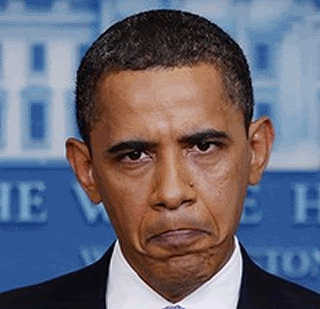
President Obama: In decline? (Photo: AFP)
The last few weeks have been a nightmare for President Obama, in a summer of discontent in the United States which has deeply unsettled the ruling liberal elites, so much so that even the Left has begun to turn against the White House. While the anti-establishment Tea Party movement has gained significant ground and is now a rising and powerful political force to be reckoned with, many of the president’s own supporters as well as independents are rapidly losing faith in Barack Obama, with open warfare breaking out between the White House and the left-wing of the Democratic Party. While conservatism in America grows stronger by the day, the forces of liberalism are growing increasingly weaker and divided.
Against this backdrop, the president’s approval ratings have been sliding dramatically all summer, with the latest Rasmussen Daily Presidential Tracking Poll of US voters dropping to minus 22 points, the lowest point so far for Barack Obama since taking office. While just 24 per cent of American voters strongly approve of the president’s job performance, almost twice that number, 46 per cent, strongly disapprove. According to Rasmussen, 65 per cent of voters believe the United States is going down the wrong track, including 70 per cent of independents.
The RealClearPolitics average of polls now has President Obama at over 50 per cent disapproval, a remarkably high figure for a president just 18 months into his first term. Strikingly, the latest USA Today/Gallup surveyhas the President on just 41 per cent approval, with 53 per cent disapproving.
There are an array of reasons behind the stunning decline and political fall of President Obama, chief among them fears over the current state of the US economy, with widespread concern over high levels of unemployment, the unstable housing market, and above all the towering budget deficit. Americans are increasingly rejecting President Obama’s big government solutions to America’s economic woes, which many fear will lead to the United States sharing the same fate as Greece.
Growing disillusionment with the Obama administration’s handling of the economy as well as health care and immigration has gone hand in hand with mounting unhappiness with the President’s aloof and imperial style of leadership, and a growing perception that he is out of touch with ordinary Americans, especially at a time of significant economic pain. Barack Obama’s striking absence of natural leadership ability (and blatant lack of experience) has played a big part in undermining his credibility with the US public, with his lacklustre handling of the Gulf oil spill coming under particularly intense fire.
On the national security and foreign policy front, President Obama has not fared any better. His leadership on the war in Afghanistan has been confused and at times lacking in conviction, and seemingly dictated by domestic political priorities rather than military and strategic goals. His overall foreign policy has been an appalling mess, with his flawed strategy of engagement of hostile regimes spectacularly backfiring. And as for the War on Terror, his administration has not even acknowledged it is fighting one.
Can it get any worse for President Obama? Undoubtedly yes. Here are 10 key reasons why the Obama presidency is in serious trouble, and why its prospects are unlikely to improve between now and the November mid-terms.
1. The Obama presidency is out of touch with the American people
In a previous post I noted how the Obama presidency increasingly resembles a modern-day Ancien Régime, extravagant, decaying and out of touch with ordinary Americans. The First Lady’s ill-conceived trip to Spain at a time of widespread economic hardship was symbolic of a White House that barely gives a second thought to public opinion on many issues, and frequently projects a distinctly elitist image. The “let them eat cake” approach didn’t play well over two centuries ago, and it won’t succeed today.
2. Most Americans don’t have confidence in the president’s leadership
This deficit of trust in Obama’s leadership is central to his decline. According to a recent Washington Post/ABC News poll, “nearly six in ten voters say they lack faith in the president to make the right decisions for the country”, and two thirds “say they are disillusioned with or angry about the way the federal government is working.” The poll showed that a staggering 58 per cent of Americans say they do not have confidence in the president’s decision-making, with just 42 per cent saying they do.
3. Obama fails to inspire
In contrast to the soaring rhetoric of his 2004 Convention speech in Boston which succeeded in impressing millions of television viewers at the time, America is no longer inspired by Barack Obama’s flat, monotonous and often dull presidential speeches and statements delivered via teleprompter. From his extraordinarily uninspiringAfghanistan speech at West Point to his flat State of the Union address, President Obama has failed to touch the heart of America. Even Jimmy Carter was more moving.
4. The United States is drowning in debt
The Congressional Budget Office Long-Term Budget Outlook offers a frightening picture of the scale of America’s national debt. Under its alternative fiscal scenario, the CBO projects that US debt could rise to 87 percent of GDP by 2020, 109 percent by 2025, and 185 percent in 2035. While much of Europe, led by Britain and Germany, are aggressively cutting their deficits, the Obama administration is actively growing America’s debt, and has no plan in place to avert a looming Greek-style financial crisis.
5. Obama’s Big Government message is falling flat
The relentless emphasis on bailouts and stimulus spending has done little to spur economic growth or create jobs, but has greatly advanced the power of the federal government in America. This is not an approach that is proving popular with the American public, and even most European governments have long ditched this tax and spend approach to saving their own economies.
6. Obama’s support for socialised health care is a huge political mistake
In an extraordinary act of political Harakiri, President Obama leant his full support to the hugely controversial, unpopular and divisive health care reform bill, with a monstrous price tag of $940 billion, whose repeal is now supported by 55 per cent of likely US voters. As I wrote at the time of its passing, the legislation is “a great leap forward by the United States towards a European-style vision of universal health care, which will only lead to soaring costs, higher taxes, and a surge in red tape for small businesses. This reckless legislation dramatically expands the power of the state over the lives of individuals, and could not be further from the vision of America’s founding fathers.”
7. Obama’s handling of the Gulf oil spill has been weak-kneed and indecisive
While much of the spilled oil in the Gulf has now been thankfully cleared up, the political damage for the White House will be long-lasting. Instead of showing real leadership on the matter by acing decisively and drawing upon offers of international support, the Obama administration settled on a more convenient strategy of relentlessly bashing an Anglo-American company while largely sitting on its hands. Significantly, a poll of Louisiana voters gave George W. Bush higher marks for his handling of the aftermath of Hurricane Katrina, with 62 percent disapproving of Obama’s performance on the Gulf oil spill.
8. US foreign policy is an embarrassing mess under the Obama administration
It is hard to think of a single foreign policy success for the Obama administration, but there have been plenty of missteps which have weakened American global power as well as the standing of the United States. The surrender to Moscow on Third Site missile defence, the failure to aggressively stand up to Iran’s nuclear programme, the decision to side with ousted Marxists in Honduras, the slap in the face for Great Britain over the Falklands, have all contributed to the image of a US administration completely out of its depth in international affairs. The Obama administration’s high risk strategy of appeasing America’s enemies while kicking traditional US allies has only succeeded in weakening the United States while strengthening her adversaries.
9. President Obama is muddled and confused on national security
From the wars in Afghanistan and Iraq to the War on Terror, President Obama’s leadership has often been muddled and confused. On Afghanistan he rightly sent tens of thousands of additional troops to the battlefield. At the same time however he bizarrely announced a timetable for the withdrawal of US forces beginning in July 2011, handing the initiative to the Taliban. On Iraq he has announced an end to combat operations and the withdrawal of all but 50,000 troops despite a recent upsurge in terrorist violence and political instability, and without the Iraqi military and police ready to take over. In addition he has ditched the concept of a War on Terror, replacing it with an Overseas Contingency Operation, hardly the right message to send in the midst of a long-war against Al-Qaeda.
10. Obama doesn’t believe in American greatness
Barack Obama has made it clear that he doesn’t believe in American exceptionalism, and has made apologising for his country into an art form. In a speech to the United Nations last September he stated that “no one nation can or should try to dominate another nation. No world order that elevates one nation or group of people over another will succeed. No balance of power among nations will hold.” It is difficult to see how a US president who holds these views and does not even accept America’s greatness in history can actually lead the world’s only superpower with force and conviction.
There is a distinctly Titanic-like feel to the Obama presidency and it’s not hard to see why. The most left-wing president in modern American history has tried to force a highly interventionist, government-driven agenda that runs counter to the principles of free enterprise, individual freedom, and limited government that have made the United States the greatest power in the world, and the freest nation on earth.
This, combined with weak leadership both at home and abroad against the backdrop of tremendous economic uncertainty in an increasingly dangerous world, has contributed to a spectacular political collapse for a president once thought to be invincible. America at its core remains a deeply conservative nation, which cherishes its traditions and founding principles. President Obama is increasingly out of step with the American people, by advancing policies that undermine the United States as a global power, while undercutting America’s deep-seated love for freedom.




